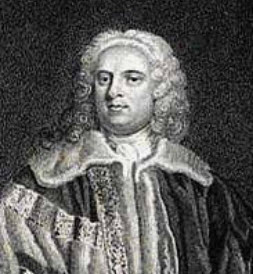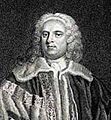James Hamilton, 6th Earl of Abercorn facts for kids
Quick facts for kids
James Hamilton
|
|
|---|---|
| Earl of Abercorn | |
|
Detail from the portrait below
|
|
| Tenure | 1701–1734 |
| Predecessor | Charles, 5th Earl of Abercorn |
| Successor | James, 7th Earl of Abercorn |
| Born | c. 1661 |
| Died | 28 November 1734 |
| Buried | Westminster Abbey |
| Spouse(s) | Elizabeth Reading |
| Issue Detail |
James, George, Jane, Charles, & others |
| Father | James Hamilton |
| Mother | Elizabeth Colepeper |
James Hamilton, 6th Earl of Abercorn (born around 1661 – died 1734), was an important person in Scottish and Irish history. He was a nobleman and a politician.
When his father died in battle, James became a special assistant to King Charles II. Later, during the Glorious Revolution in 1688, he supported William of Orange. In March 1689, he helped the city of Derry by bringing supplies. This allowed Derry to survive a long attack called the Siege of Derry until help arrived in August.
After he inherited noble titles from a relative, he was given an even higher title in Ireland. This was a reward for his help to King William.
Contents
Early Life and Family
James Hamilton was born around 1661 or 1662. He was the oldest son of James Hamilton and Elizabeth Colepeper. His father was a colonel in the English army and also worked for King Charles II.
James's family was a branch of the powerful Abercorn family. His great-grandfather, Sir George Hamilton, 1st Baronet, of Donalong, was the fourth son of the 1st Earl of Abercorn.
James's mother was the daughter of John Colepeper, 1st Baron Colepeper, an English courtier. His parents got married in 1661. James was one of six sons, but only three lived to be adults. James was raised as a Protestant. His father had been Catholic but changed his religion to marry his mother.
Family Titles and Land
When James was about twelve years old, in June 1673, his father died. He had been wounded in a sea battle against the Dutch during the Third Anglo-Dutch War. As a reward for his father's service, James became an extra assistant to the King in 1680.
His father died before James's grandfather. So, when his grandfather passed away in 1679, James inherited land in Ireland called Donalong, located between Strabane and Derry. He was supposed to inherit his grandfather's title, "Baronet Hamilton of Donalong," but he never used it. He preferred to be called "Captain Hamilton," which was his rank in the English army.
Marriage and Children
In January 1684, Captain Hamilton married Elizabeth Reading. She was the daughter of Sir Robert Reading, a wealthy man from Dublin. King Charles II wanted to give James the title "Baron Hamilton of Bellamont" in Ireland, but this never officially happened.
James and Elizabeth had many children, including nine sons and five daughters:
- Sons:
- James (1686–1744), who became the 7th Earl.
- John (around 1694 – 1714), who never married.
- George (died 1775), who became a Member of Parliament (MP). He married and had children.
- Rev. Hon. Francis Hamilton (1700–1746), who married and had children.
- William (1703–1721), who was lost at sea on a ship called HMS Royal Anne Galley.
- Charles (1704–1786), who also became an MP. He married and had children.
- Daughters:
- Elizabeth Hamilton, who married twice. Through her first marriage, she is an ancestor of the famous actor Ralph Fiennes.
- Mary (born before 1704), who married Henry Colley and had children.
- Philippa Hamilton (died 1767), who married twice and had one son from her second marriage.
- Jane (before 1704 – 1753), who married Archibald Douglas-Hamilton.
Helping Derry
After King Charles II died in 1685, Captain Hamilton's job at the palace ended. He continued his career in the army under the new king, James II.
In 1688, a big change happened in England called the Glorious Revolution. James Hamilton chose to support William of Orange. In the spring of 1689, when war was threatening in northern Ireland, James was sent to Derry. His mission was to bring supplies to help the city get ready for a possible attack.
On March 21, 1689, he arrived in Derry from England with two ships. They carried gunpowder, ammunition, weapons, and money. These supplies were very important for Derry during the Siege of Derry. He also brought official papers from King William and Queen Mary, confirming that Colonel Robert Lundy would be the new governor of the town.
So, James Hamilton played a key role in defending Derry. Interestingly, his uncle, Richard Hamilton (officer), who was a general in the Irish army, was part of the forces attacking Derry.
Becoming a Member of Parliament
After the Williamite war in Ireland ended, James Hamilton was chosen as one of the two Members of Parliament (MPs) for County Tyrone. He was elected to the Irish House of Commons on September 22, 1692, and again on August 12, 1695.
Becoming the 6th Earl
In June 1701, his second cousin, Charles Hamilton, 5th Earl of Abercorn, died in Strabane without any children who lived. James Hamilton was his second cousin because they shared the same great-grandfather, James Hamilton, 1st Earl of Abercorn.
Because of this, Captain Hamilton became the 6th Earl of Abercorn in Scotland and the 7th Baron Hamilton of Strabane in Ireland. His oldest son, James, then received the special title of Lord Paisley, which is given to the son who will inherit the earldom. The new Lord Abercorn also took control of the lands that came with these titles.
About six months later, on December 2, 1701, King William rewarded Lord Abercorn even more. He gave him the titles of Viscount Strabane and Baron Mountcastle, both in Ireland. The title of Viscount Strabane was an upgrade from his earlier title and likely helped him have a higher rank in the Irish House of Lords.
Lord Abercorn took his place in the Irish House of Lords (as Viscount Strabane) on September 21, 1703. He also took his seat in the Parliament of Scotland (as Earl of Abercorn) on October 3, 1706. By April 1711, he was also appointed to the Privy Council of Ireland, a group of important advisors to the King.
His father-in-law had built several lighthouses along Ireland's coast. These lighthouses were given to Hamilton as part of his wife's dowry (money or property brought by a bride to her husband). In 1703, the Irish government found that the lighthouses were not being looked after well, so they took them over. Hamilton was paid £3,000 as compensation.
Death and Legacy
Lord Abercorn died on November 28, 1734, when he was about 73 years old. He was buried on December 3 in a special vault at Westminster Abbey in London.
His oldest son, James, became the 7th Earl after him. James's wife, Elizabeth, passed away later, in 1754.
Abercorn Street in Savannah, Georgia, in the United States, is named after the 6th Earl.
Images for kids
 | Sharif Bey |
 | Hale Woodruff |
 | Richmond Barthé |
 | Purvis Young |



